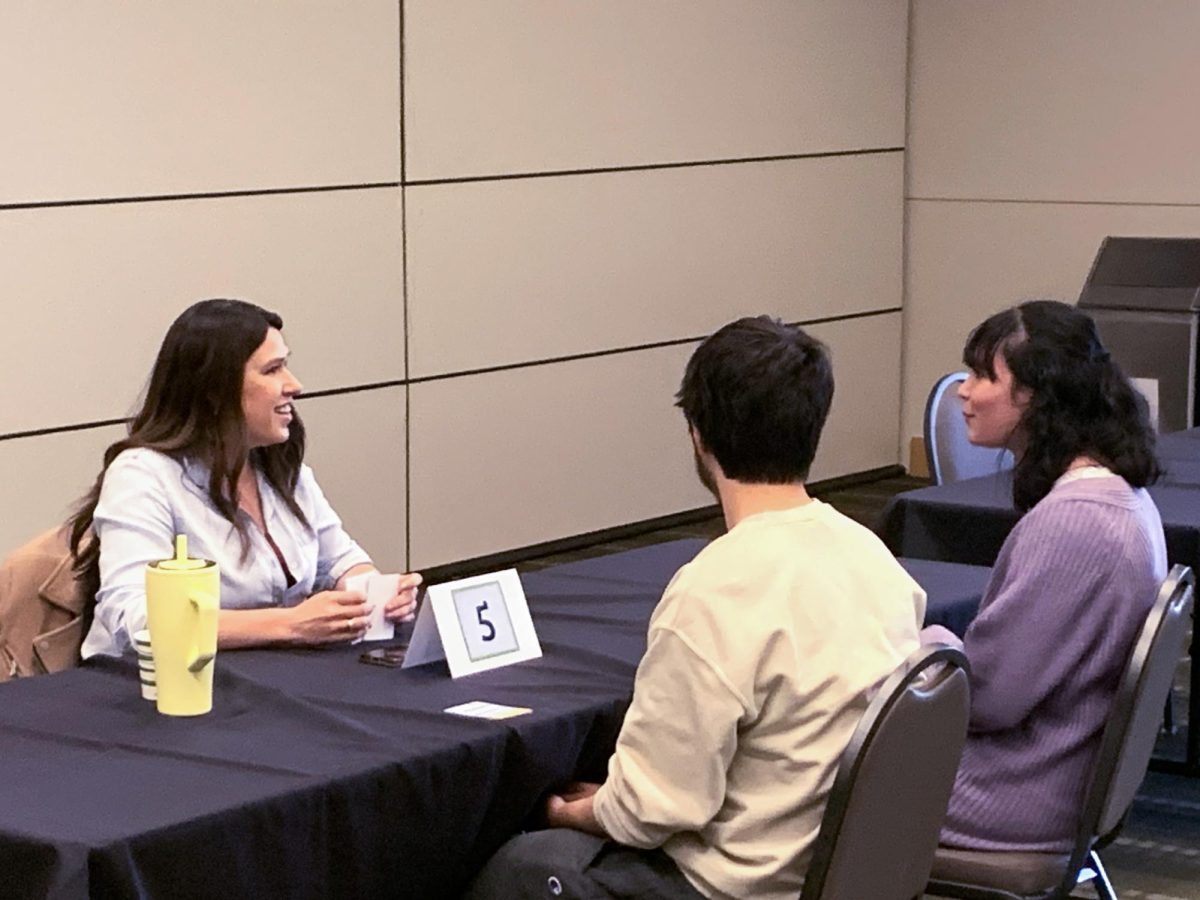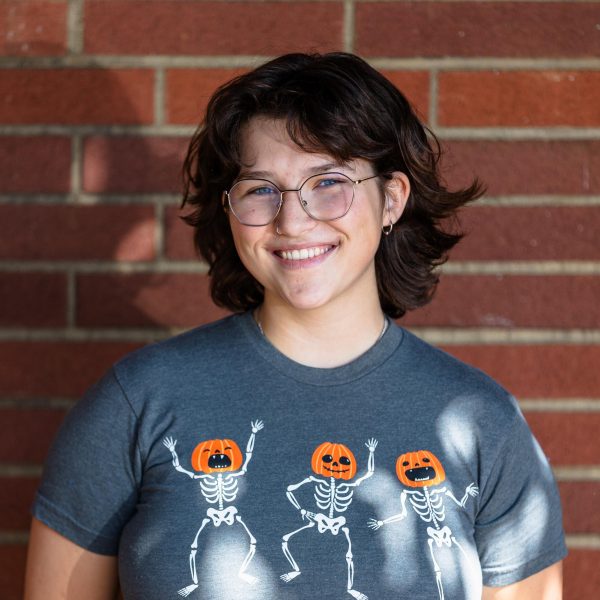Seattle Pacific University students and faculty gathered on Wednesday, April 24, 2024, to play a round of Prof-A-Palooza. One professor sat at each table, and students changed tables every six minutes to reconnect with—or meet for the first time—professors of political science, Biblical studies, mathematics and more.
The “Professor Speed Dating” event, the brainchild of ASSP officers Maxwell Hayden and Evan Teigland, was developed to build community.
“If we encourage even one ‘Hi! How are you?’ as an otherwise unrelated student and professor pass each other by, then we did our job,” said Hayden, senior honors and politics, philosophy and economics major.
Teigland and Hayden pitched the idea to the Faculty Senate and coordinated with Sodexo and ASSP to reserve Upper Gwinn and refreshments, which included fruit and cookies.
“The faculty encouragement throughout this process was wonderful,” said Teigland, senior honors, film and English creative writing major. “From there, it came down to a lot of practical movements, spending a lot of time putting together spreadsheets and Google forms so we could build the speed-meeting system.”
Professors and students registered beforehand by answering various questions about themselves, such as where they grew up, their favorite hobbies and their area of study. Teigland and Hayden entered that information into cards, which participants picked up before the event.
When they sat at a new table, students and professors exchanged their cards, sparking conversation about everything from gardening to the Midwest.
I, Ella Beth Sessions, walked into Prof-A-Palooza with five questions and a press pass. My personal card included where I grew up (Kansas) and my favorite hobbies (reading and walking). At the five tables I visited, I saw faculty members I knew and ones I did not. My first question to each was this:
“Name?”
Ruth Ediger – political science, Kevin Neuhouser – sociology, Sarah Koenig – Biblical studies, Joshua Tom – sociology, Sarah McCord – mathematics and Todd Rendleman – communication and film, told me accordingly.
“Favorite class to teach?”
Ediger and Neuhouser had similar answers: whichever courses they have at the moment. Those include International Relations, International Political Economy, Introduction to Community Development and Cultural Anthropology.
“I get to teach classes I like, focused on things I’m interested in,” Neuhouser said. “I’m very fortunate.”
Tom loves to teach Honors Core: Culture and Social Systems to first-year Honors students. McCord tried explaining to me, an English literature major, why Differential Equations were interesting, but I found her love for Mathematics of Art much easier to understand.
“Niche interest?”
Neuhouser’s niche is well-known to his students: Brazil! Koenig chose “reception history,” which is how the Bible has been received throughout history. Tom bounced off that thought and expressed how he spends “18 hours a day” thinking about Evangelism.
Rendleman just returned from the 25th annual film festival, Ebertfest, put on by his alma mater, the University of Illinois. The film professor’s favorite niche is the festival named after Illinois film critic Roger Ebert.
“I deposited my dissertation the morning of the first Roger Ebert festival,” Rendleman remembered. “My reward was a whole weekend in that little theater, just watching movies.”
“What are you here to say to students?”
Ediger had a simple answer:
“I just like to talk to students,” she said with a smile.
Tom continued on the same line:
“I have no agenda. I just like chatting with students,” Tom said.
McCord finds it necessary to direct students to study what they are curious about and enter a field they enjoy.
“We’re here for you,” Rendleman finished. “If you’re not here, our jobs aren’t very compelling.”
By question five, my six minutes with professors had almost run out. Only three remained to hear it:
“One thing you always want to talk about but is never brought up?”
Ediger is a talented, self-taught craftswoman. Quilting and spinning are topics of conversation she loves. On putting the question to McCord, she pauses.
“Philosophy and thinking about the bigger picture,” McCord said.
Neuhouser has trouble coming up with an answer, but not because he is short on conversation points.
“I usually just bring up whatever I want to talk about,” Neuhouser said, sparking laughter on both sides of the table. “Maybe that’s the old-white-male-professor privilege.”
I was not the only student attending, nor were Ediger, Neuhouser, Koenig, Tom, McCord and Rendleman the only faculty members. Emerie Cantrell, a third-year business major, admired the concept of a Prof-A-Palooza.
“I love the idea of being able to connect with professors that maybe I wouldn’t know,” Cantrell said. “Turns out I didn’t know any of them except one.
Cantrell spoke with Koenig first. She then met history professor Alissa Walter.
“Then I got to speak to Dr. Matt Benton, and he grew up in California, so I got to meet a fellow Californian here,” Cantrell said. “We talked about gardening and how he’s growing a little garden.”
Cantrell then met business librarian Janet Hauck, a fellow singer who brought a bowl of candy to share. She discussed hiking and different trails with Philip Baker to wrap up her palooza.
“I really loved the way that, whenever the bell was rung for students to swap to new professors, you could tell that they were so deeply invested in their current conversation that they weren’t quite ready to leave,” Teigland said. “To me, it signaled a desire from both students and professors to continue getting to know the person in front of them.”
With graduation just around the corner, Teigland and Hayden hope to pass this event on to passionate planners to make it a quarterly tradition on campus.
“I believed in the value of students and professors coming together going into the event, but what surprised me the most was truly how much fun the students were having,” Hayden said. “As more and more people leap to do this, we have a tried-and-true tradition on our hands.”
Although fewer students participated than originally hoped for, Teigland and Hayden are pleased with the event’s outcome.
“I’d hazard to say that we did help facilitate a bit of camaraderie between students and faculty,” Teigland said. “At the very least, the professors and students I managed to speak with post-event expressed having a great time, and I think that joy is the first critical step of strengthening a community.”


















































































